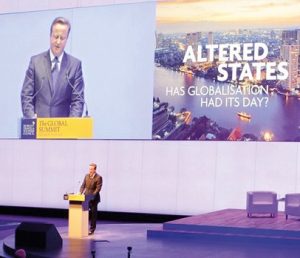Travel & Tourism has thrived as a result of globalization. Its very existence relies on openness and movement across countries and regions, and it is spurred on by international trade. Yet events over the past year have reflected some pushback against such global principles. Discussions on stage at the WTTC Global Summit in Bangkok centered on how the sector can continue to grow in this environment, and how it can act against some of the negative implications of opposition to globalization.
Ian Goldin, Professor of Globalisation and Development at the University of Oxford, highlighted that globalization has played a key role in global growth over the last years, as the lack of barriers has allowed the ‘brain power’ of the world to flourish. He also stated that there are no better ambassadors for globalization than the Travel & Tourism sector.
But some people have been left behind in some societies, not just from an economic perspective. These individuals have turned to more nationalist attitudes in an attempt to prioritise or boost domestic prospects. Such change has contributed to some of the biggest shifts in the last year, with the election of President Trump and the UK’s decision to leave the EU being two notable examples. And since globalization has connected the world, it has also allowed such movements against globalization to become a more global development.
Globalization, however, still remains a principle valued by many. And perhaps the strongest supporters come from emerging markets. Amitabh Kant, CEO of NITI Aayog, told the audience that while the idea is being challenged elsewhere, India is still a believer in globalization. The subcontinent has been opening its industries, and its economic growth demonstrates that such opening up does pay off.
And recent events don’t have to represent a permanent change. David Cameron shared this optimistic view — that Trump and Brexit do not indicate that globalization has irreversibly failed. But clearly they have complicated some of the progress that has been made in opening up the world, and a course correction will be required to smooth the world back onto that path. Cameron argues that free economies and free societies remain best for the world. And also for Travel & Tourism, as it has helped more people find access to travel.
So how can Travel & Tourism engage in these global developments? Arne Sorenson, President & CEO of Marriott International, reminded tourism leaders that it’s not enough for the sector to repeat the values it believes in and shares — it needs to actively address the reasons why people are upset. In terms of immigration, the sector needs to recognize that travel policy does have a link to immigration concerns, and work with the public sector to address the concerns, through using biometrics more effectively, for example. At the same time there are also opportunities. A global trusted traveler would enhance security by sharing information more freely while also making travel smoother for individuals.
In some places, nationalism is also showing itself in a direct backlash against tourism itself, especially in places where foreign tourists are appearing to crowd out local populations. To address the risk such opposition will bring to the sector, it needs to be active in identifying and managing pressure points. And ensure that the local population receives an appropriate share of the profits of Travel & Tourism, rather than it all being leaked abroad to foreign countries or multinational companies.
Including as many people as possible in the tremendous benefits — both economic and social — that Travel & Tourism can bring is therefore perhaps the sectors’ most significant contribution to ensuring nationalism doesn’t crowd out the positive impacts of globalization.
eTurboNews is a media partner for WTTC.







Leave a Comment